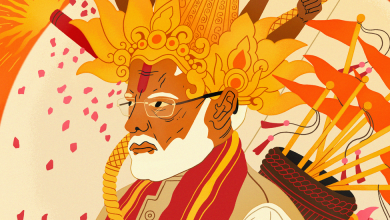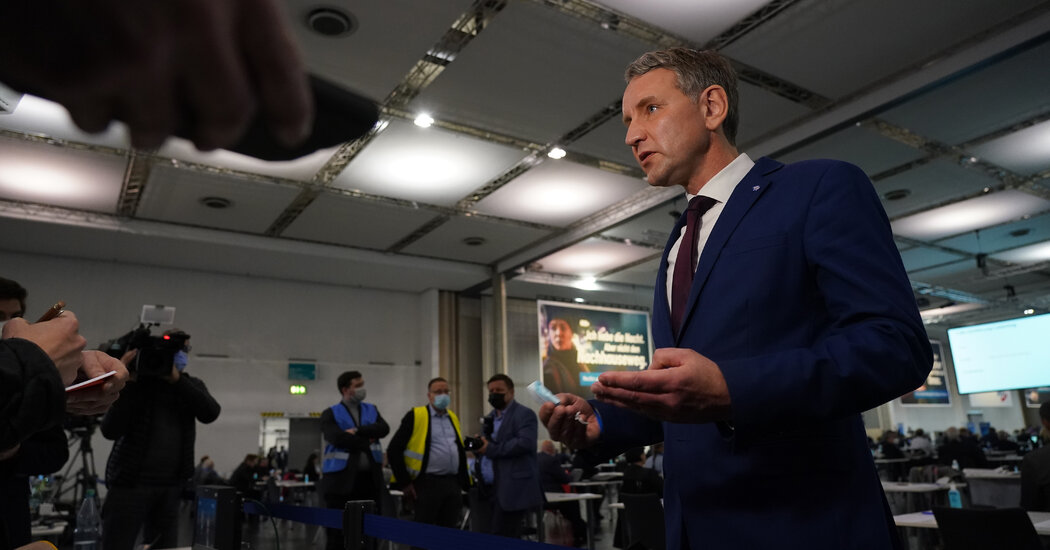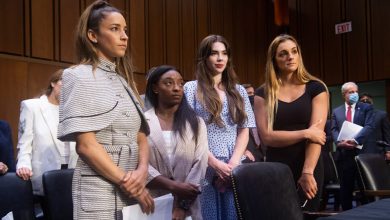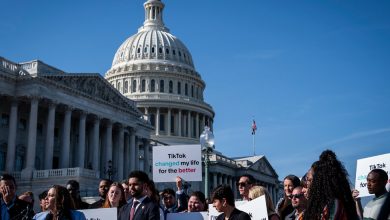Israeli and Palestinian Activists Ask Americans to Take Side of Peace

When Sally Abed and Alon-Lee Green flew from Israel to New York last week, they found a version of the United States they’d never seen before: split by the conflict between Palestinians and Israelis, with fractures tearing at the worlds of art, business, books, academia and even food.
Ms. Abed, a Palestinian citizen of Israel, said the situation felt so toxic that they feared their 10-day trip to talk about the ways Palestinians and Jews can work together would only lead to attacks from all sides.
Instead, in New York, Washington and Boston, they found packed auditoriums and eager audiences in community centers, synagogues, libraries and the offices of politicians like Bernie Sanders and Alexandria Ocasio-Cortez. Their days have started at 6 a.m. and ended after midnight.
Their quest can be lonely, standing in the face of intense grief and anger — over Hamas’s attacks against Israelis on Oct. 7, and Israel’s retaliatory campaign in the Gaza Strip — and factions that have spent decades staking out positions against each other.
But the staff of their organization, Standing Together, are trying to teach Americans — anyone who will listen, really — about their lived reality and the only path they see moving forward. They describe that path as one that cannot be boiled down to a hashtag: one in which millions of Israelis and Palestinians would remain on the land they each call home, and one that would require enough popular political will to demand peace.
“We’re trying to play a different game in Israel and Palestine,” Mr. Green said on Nov. 9 to a group of people organized by a group in Brooklyn, Jews for Racial and Economic Justice. “And this game is very simple. It says that both Jewish people and Palestinians are going to stay on this land. No one is going anywhere.”
“We need to start working from this point,” he said, receiving a wave of nods.
It’s a message that has not been prominently heard or seen in many American protests and rallies. Most events have taken place under an Israeli or Palestinian flag, focusing on one people’s pain, struggle or victimhood.
That type of narrow approach can erase everything around it, said Cara Raich, a conflict adviser based in New York.
“As with most conflicts one feels deeply and personally, a binary choice often offers the simple comfort of pro and con, or right and wrong,” she said. “The magnetic power of false binaries sucks everything that it touches into that paradigm.”
For that reason, the conversations Mr. Green and Ms. Abed came to have with Americans have, at least for their audiences they draw, been something of a spiritual salve. In dozens of talks up and down the East Coast, the two activists have described a desperate need for new Israeli and Palestinian leadership, including leaders willing to work together.
They have called Hamas, the group that controls the Gaza Strip, both “the enemy of the Palestinian people” and a “fertilizer for radical Jewish extremism.” And they have voiced a frustration over what they see as a war for the moral high ground, happening outside of Israel and mostly over social media, that denies their experiences.
Libby Lenkinski, a vice president at the New Israel Fund, an organization that funds and supports Israeli and Palestinian human rights groups, has had a front-row seat as a moderator. She said she has seen a “palpable sense of relief” among attendees who audibly exhale or place hands over their hearts. The message is so resonant, she said, because of it offers a different kind of simplicity than choosing one of two sides.
“This isn’t, ‘Kumbaya, let’s all hold hands and love each other,’” Ms. Lenkinski said. “It’s: ‘There’s actually no way that one side is going to win. Our futures are intertwined and the only way that we can keep ourselves alive is by keeping each other alive.’”
On Sunday, a group of Israeli peace activists in New York City organized a vigil with that sentiment in mind. The demonstration called for both a cease-fire in Israel’s military campaign in Gaza and the release of more than 200 hostages held by Palestinian militants. All were welcome, flags and signs were not.
Some 200 attendees gathered to mourn and read testimonies and texts from people in Israel and Gaza.
Tamar Glezerman, one of the organizers, said she had protested in support of a cease-fire before, and does not “find myself in protests that don’t include the demand for an urgent stop to the bloodshed.”
“But at the same time,” she said, “I feel that, on a very personal level, I am being demanded to omit the humanity of my loved ones, those who have died on Oct. 7 and those who have friends and families among the kidnapped, in order to attend most of the protests demanding a cease-fire.”
She said that those demonstrations “have by and large completely omitted these civilians, for either ideological or strategic reasons, as if empathy for brutalized civilians was ever a zero-sum game. As if one war crime could ever justify another. As if acknowledgment means historical symmetry.”
Ms. Abed and Mr. Green were in Washington during that vigil, meeting with a range of Democratic politicians. They said that, sometimes, they struggled to get to the car for their next meeting because people swarmed to ask what more they could do to help.
Friendship has helped carry the pair on, they said, even as exhaustion has weighed them down.
They did not sleep much back home, and they have not slept much since arriving in the states. Mr. Green said he’s afraid to stop working. Ms. Abed worries that he’s not giving himself the space to fall apart, at least a little bit.
Midsentence, Mr. Green gasped. “A goose!” he screamed — Ms. Abed echoed, “a goose!” They laughed and gawked, getting closer to the bird. There are not many geese in Israel.
But it was not quite a wild-goose chase. They were summoned on to their next meeting, one with students and faculty at M.I.T. “So many people tell us ‘You are our only hope,’” Ms. Abed said. “It’s like, we’re your only hope?”
Mr. Green said that, despite the loneliness they often felt, they had no choice but to keep trying.
“We have only one home,” he said. “She’s Palestinian and I’m Jewish, but the only home we both have is the same home.”




